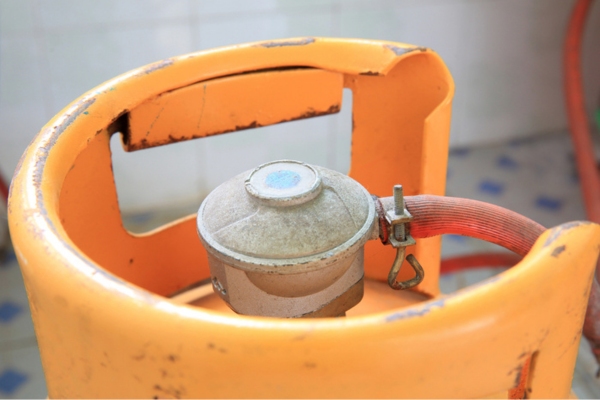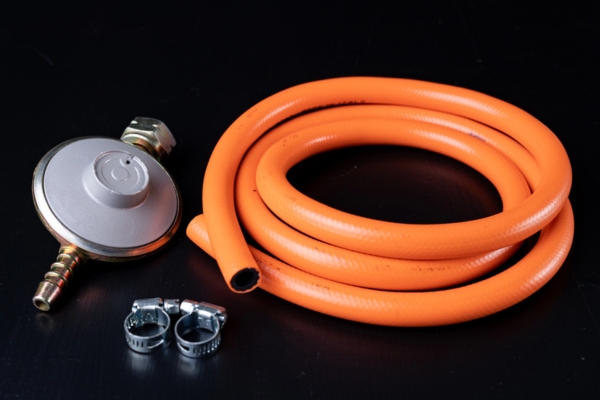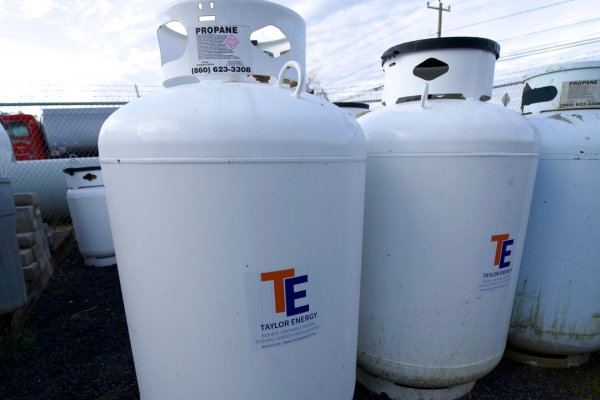Contents
- Propane Tank Regulators: Their Purpose and Importance
- What Does a Propane Tank Regulator Do?
- The Importance of a Propane Tank Regulator
- Varieties of Propane Tank Regulators
- Warning Signs Your Regulator Requires Attention
- How Can Taylor Energy Support You
- Propane Tank Regulators: FAQs
- Conclusion
- Contact Taylor Energy for Reliable Propane Delivery Services
Did you know that a well-functioning propane tank regulator is essential for preventing fuel waste and avoiding potential safety risks? At Taylor Energy, trusted for dependable propane delivery and professional propane tank installations, we highlight the importance of keeping your system operating at peak performance.
This article will examine the critical functions of propane tank regulators, review the various types on the market, and emphasize why consistent inspections and attentive upkeep are vital to ensuring safety and efficiency in your propane system.
Trust Taylor Energy for Dependable Propane Solutions! Whether you need a new tank installed or timely propane delivery, our team is ready to serve you. Contact us now!
Propane Tank Regulators: Their Purpose and Importance

Propane tank regulators are crucial components that manage the pressure of propane as it leaves the tank, ensuring appliances receive fuel safely and efficiently. Gaining knowledge about these devices is key to preserving the performance and safety of your propane system.
Choose Taylor Energy for Expert Propane Services! From professional tank setups to prompt fuel deliveries, we provide the support you can count on. Call today!
What Does a Propane Tank Regulator Do?

A propane tank regulator is an essential safety device connected to your propane tank that regulates and stabilizes the gas pressure, ensuring appliances receive it at a steady and secure level. Its primary function is to reduce the high-pressure propane inside the tank to a lower, manageable pressure that household appliances can safely handle.
This control is crucial for maintaining stability and keeping the gas pressure consistent, regardless of outside conditions or the amount of propane remaining in the tank. That steady flow allows your appliances to operate efficiently and reliably for heating, cooking, and other uses.
Propane Services You Can Rely On! Taylor Energy provides professional solutions tailored for your home or business. Call us today!
The Importance of a Propane Tank Regulator

Propane tank regulators play a crucial role in preventing over-pressurization, a key factor in ensuring the safe operation of any propane system. They manage the flow of propane leaving the tank, keeping it within safe levels to avoid leaks or potential explosions.
For instance, if a regulator is not functioning properly, increased tank pressure resulting from high temperatures could force excessive propane into the system, creating a hazardous fire or explosion risk.
In addition to ensuring safety, regulators improve the efficiency of propane appliances. By maintaining stable pressure, they enable equipment such as furnaces and stoves to operate properly, maximizing fuel efficiency and reducing expenses.
They also support compliance with safety codes and operational requirements, protecting system reliability while helping meet environmental guidelines.
Stay Comfortable with Taylor Energy! Rely on our team for professional propane delivery and dependable service. Call today!
Varieties of Propane Tank Regulators

Propane tank regulators are classified according to their purpose and the point at which they adjust the gas pressure from the tank. Each type plays a distinct role in maintaining safe and efficient propane delivery to household appliances.
- First Stage Regulators: These attach directly to the propane tank and are built to manage high pressure. Their main task is to reduce the tank’s pressure to a more controlled level, generally around 10 to 15 psi. This first step in lowering pressure is vital for ensuring propane moves safely to the next stage of regulation.
- Second Stage Regulators: Positioned after the first stage, these regulators receive the intermediate pressure and bring it down further to a low, practical level, typically about 11 inches of water column. This precise regulation is vital for safe and effective appliance function, ensuring the gas flow remains appropriate for household needs.
- Integral Two-Stage Regulators: These devices merge the first and second-stage regulators into one compact unit, making them perfect for smaller residential propane systems. They effectively lower high tank pressure directly to appliance-level pressure in a single step, streamlining the setup and reducing the chance of leaks.
- Adjustable Regulators: These regulators enable manual control of the output pressure and are used in specialized situations where standard pressure levels are inadequate. They offer flexibility in regulating propane flow for specific requirements, such as in commercial or industrial applications where gas usage can change considerably.
Here is a comparison of the various propane tank regulator types:
| Regulator Type | Pressure Step | Primary Use |
| First Stage Regulator | Single (High down to Medium) | Reducing tank pressure to a manageable level |
| Second Stage Regulator | Single (Medium down to Low) | Adjusting pressure for safe appliance use |
| Integral Two-Stage Regulator | Dual (High directly to Low) | Compact residential systems; space-saving |
| Adjustable Regulator | Variable | Custom applications with changing demands |
Warning Signs Your Regulator Requires Attention
Identifying when your propane regulator needs inspection or replacement is vital to keeping your propane system safe and efficient. Some common warning signs include:
- Strange Sounds: Hissing or whistling from the regulator may indicate a leak or unstable pressure.
- Irregular Appliance Operation: Appliances that fail to run consistently or show fluctuating flames may be experiencing poor pressure control.
- Ice Formation: Frost or ice buildup on the regulator, particularly during mild conditions, often suggests a problem such as a stuck valve or too much moisture in the system.
Regular inspections are essential for catching these problems early and protecting the safety and efficiency of your propane system. Consistent checks can reveal signs of wear, corrosion, or damage that might result in failures. These preventive steps keep the system operating reliably while lowering the chance of sudden interruptions or dangerous situations.
Turn to Taylor Energy for Trusted Propane Services! We provide reliable solutions customized for your home or business. Reach out today!
How Can Taylor Energy Support You

Taylor Energy delivers professional propane services, including routine inspections and regulator replacements, to keep your system running safely and efficiently. With a strong commitment to safety and customer satisfaction, Taylor Energy offers expert advice and installations customized to fit each customer’s needs.
Our certified technicians have the skills to address any concerns, ensuring every installation and service meets strict safety standards and exceeds customer expectations. This approach helps protect the reliability and extend the lifespan of your propane system.
Power Your Home with Taylor Energy! Dependable propane solutions that bring comfort and ease. Reach out to us today!
Propane Tank Regulators: FAQs

How Can I Tell Which Propane Tank Regulator Fits My System?
Choosing the right propane tank regulator depends on factors like the size of your propane tank, the pressure demands of your appliances, and how far the tank is from your home or equipment. For instance, larger systems with greater pressure needs often require a two-stage regulator, while smaller or simpler systems may only need a single-stage option.
To ensure the best performance and safety, it’s wise to consult a propane expert like Taylor Energy, who can assess your setup and recommend the proper regulator.
Is It Safe to Install a Propane Tank Regulator on My Own?
Although installing a regulator may appear simple, it is not recommended. Propane systems operate under pressure and demand precise installation to prevent leaks, over-pressurization, or equipment damage. Improper setup can create serious risks, including gas leaks and fire hazards.
A certified technician has the training to connect and calibrate the regulator correctly while ensuring it meets all safety requirements, providing peace of mind and a system that operates safely.
What Are the Risks If a Propane Tank Regulator Stops Working?
A faulty regulator can create serious problems. When it cannot manage gas flow correctly, you may notice reduced appliance efficiency, fluctuating flames, or complete appliance shutdowns. In more severe cases, regulator failure can cause over-pressurization, which poses significant safety risks, or under-pressurization, which may damage appliances. Routine inspections and maintenance help prevent these problems, keeping your system safe and operating smoothly.
Professional Propane Solutions with Taylor Energy! Count on us for safe, efficient, and reliable service. Contact us today!
When Should a Propane Tank Regulator Be Replaced?
Typically, propane tank regulators last between 10 and 15 years, depending on the brand and how they are used. However, elements such as weather conditions, dirt, and debris can reduce their lifespan. Having your regulator inspected during routine system maintenance is important for spotting issues like wear, corrosion, or malfunction. If the regulator shows signs of deterioration or does not meet safety requirements, it should be replaced right away to prevent safety concerns or system problems.
Do All Propane Tank Regulators Work the Same Way?
No, propane tank regulators are designed differently to meet specific system needs. They vary in pressure capacity, design, and function. For example, high-pressure regulators are suited for certain industrial uses, while low-pressure regulators are commonly required for residential appliances.
Two-stage regulators are also available to manage high and low pressure in more complex systems. Using the wrong type can lower efficiency and compromise safety, making professional guidance essential when selecting the right regulator.
Conclusion
Propane tank regulators are essential for keeping your propane system safe, efficient, and compliant with standards. They protect against over-pressurization, support proper appliance function, and ensure your system operates reliably. Proper regulator maintenance is essential for enjoying consistent performance and safety.
For inspections, replacements, or complete propane services, Taylor Energy is here to provide professional support tailored to your needs. Safeguard your home and appliances with trusted propane solutions from Taylor Energy. Call today to schedule your appointment!
Taylor Energy: Your Trusted Propane Provider! Offering reliable solutions for tanks, fuel, and beyond. Call us today!
Contact Taylor Energy for Reliable Propane Delivery Services
Taylor Energy is committed to keeping homes and businesses across Northern Connecticut comfortable with dependable propane delivery. We focus on providing top-quality propane quickly and efficiently so you can enjoy the warmth and comfort you need without inconvenience. With competitive pricing and honest, straightforward service, your comfort is always our top priority.
Beyond propane delivery, Taylor Energy offers a full range of HVAC solutions, making us your go-to source for complete home comfort. From expert installations and regular upkeep to emergency repairs, our team handles every aspect of HVAC care.
When you choose Taylor Energy, you partner with a trusted provider dedicated to long-term reliability and customer satisfaction. Known for consistent service and strong community ties, we make sure your heating needs are met with care and professionalism. Keep your home cozy and welcoming all winter long. Contact Taylor Energy today to get started!
You can click here to contact us now or call us at (860) 623-3308 to find out more! Click the link to view our service area.

Related Articles:
